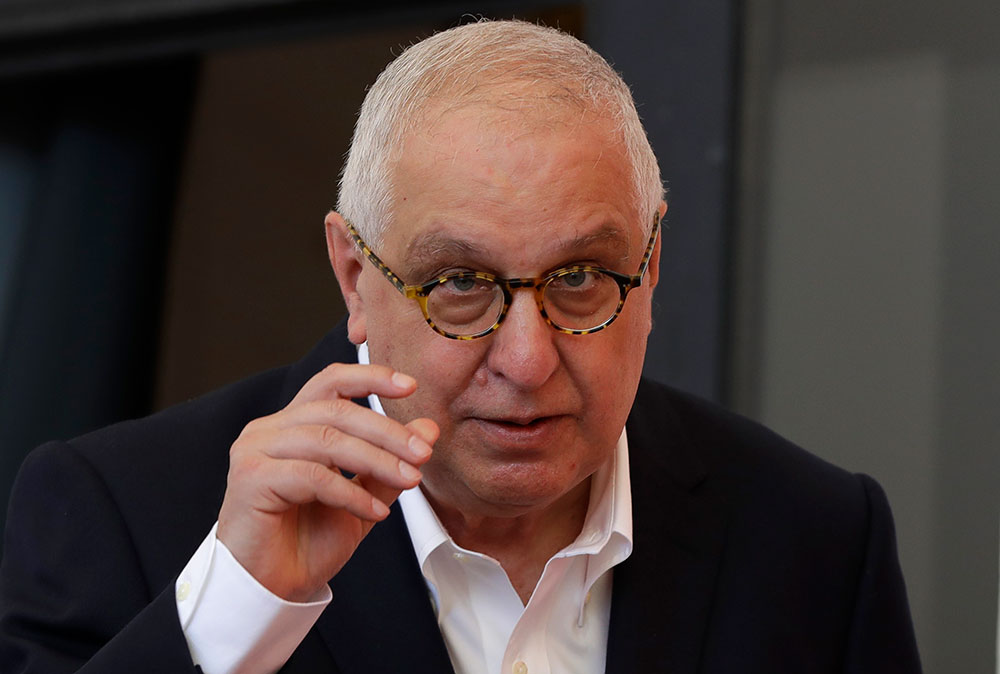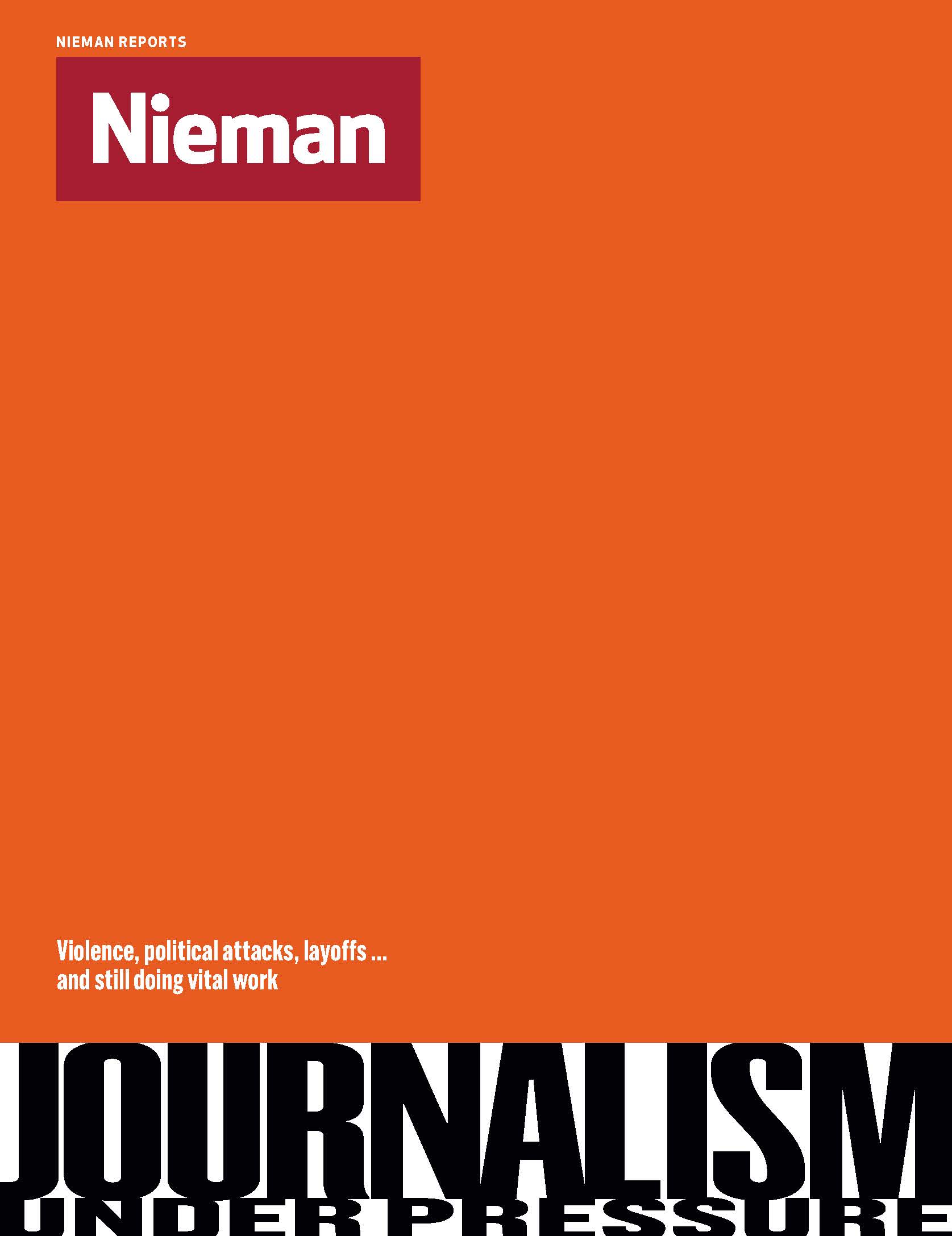
Director Errol Morris poses for photographers at the photo call for the film "American Dharma" at the 75th edition of the Venice Film Festival in Venice, Italy in September 2018. The documentary has had few screenings, and has yet to be picked up by a distributor
For the first time in his long career, Academy Award winner Errol Morris has made a film that no one will distribute. Perhaps distributors don’t like the documentary. Perhaps they don’t like the subject—Stephen K. Bannon, former chief strategist for President Donald Trump. The fact that we can’t quite tell is a feature of this political moment. It is also a problem for journalism.
We seem in search of a new journalistic rhetoric, and the possibilities are both promising and perilous
This is not the first Morris film to document a polarizing subject. “The Fog of War,” his 2003 movie about former U.S. Defense Secretary Robert S. McNamara, won an Oscar for best documentary feature. A decade later, “The Unknown Known” portrayed another defense secretary, Donald Rumsfeld. Morris did not set out to direct a trilogy, but “American Dharma,” his unsettling Bannon film, is at home with these earlier documentaries examining men who had, he says, “a destructive effect on America.”
But a form that was a Morris signature—long interviews with single subjects—has found itself in a purgatory governed by emerging rules about “normalizing” men like Bannon, someone whose inflammatory populism fueled Breitbart News before he imported it to the White House. “American Dharma” has now become its own unknown known, something we know that we do not know, a film generating plenty of coverage and opinions but very few screenings.
“It’s not a First Amendment [issue] because it isn’t the government suppressing free speech, but what is it?” asks Morris. “What is it when we’re just afraid to actually engage views that we find contrary to the way we would like to see the world?”
I invited Morris to the Nieman Foundation after arranging a campus screening of the documentary. One journalist cautioned me that showing the film could be “controversial” for Nieman. Someone asked if I thought there would be protests. I was bewildered by any suggestion that journalists should not see this work for themselves. Apparently others in the community felt the same; on a freezing Friday night, long lines of filmgoers assembled, and a second screening was arranged.
The film is only 96 minutes, but when we met with Morris, we talked for over two hours. Some aligned with a Variety critic who called “American Dharma” a “toothless bromance,” others with an IndieWire reviewer who said, “This may be the first real window into what it takes to talk back.” But far richer than reviews has been the deep debate about how journalists calibrate our stories to break through in a moment of extreme polarization, an important conversation made possible, ironically, by viewing a film that few can see.
What does it mean for journalism when we cannot examine a subject without appearing to promote it?
Morris recalled screening his 1999 documentary “Mr. Death: The Rise and Fall of Fred A. Leuchter Jr.” to a group of college students who appeared to be swayed by the subject’s Holocaust denials. “That was not my intent,” he said wryly. Before releasing the movie, he added direct denunciations of Leuchter, an edit he still laments for telling people what to think rather than asking them to think.
“To me the ironies were so unbelievably strong that you want them just to wash over people,” he said. “You don’t want to editorialize about them. If they’re incapable of seeing these ironies, then what do you do?”
Some argue that perilous political times have obviated traditional journalistic inquiry and that “American Dharma” should have conveyed a more combative stance toward Bannon—despite the fact that Morris is more visibly present and critical than in any documentary he’s made. The filmmaker was despondent. “I don’t know what I’m supposed to do. I’m supposed to infantilize my audience? I’m supposed to just play to what’s going to make them happy or feel better about themselves?”
He added: “I learned maybe it’s not possible to make movies like this anymore and that I shouldn’t make another political film ever again.”
Morris’s troubles with the film coincided with New Yorker editor David Remnick’s decision last fall to first invite then disinvite Bannon from the magazine’s annual festival. The same week Morris premiered “American Dharma” to an ovation at the Venice International Film Festival, two of the magazine’s Pulitzer-winning journalists bookended the debate:
Kathryn Schulz when Bannon was announced as a festival speaker: “I love working for @NewYorker, but I’m beyond appalled by this.”
Lawrence Wright after Bannon was disinvited: “Journalism is about hearing opposing views. I regret that this event is not taking place.”
In late 2017, The New York Times published a story about a suburban Dayton man described as “the Nazi sympathizer next door.” The piece, with its descriptions of the man’s Midwest manners and love of TV comedies, unleashed a torrent of criticism from readers and media writers who objected to anodyne treatment of a white nationalist. Some objected to covering him at all.
National editor Marc Lacey responded to the backlash with what seemed like genuine introspection, though to some critics that too was insufficient. “We regret the degree to which the piece offended so many readers,” Lacey wrote. “We recognize that people can disagree on how best to tell a disagreeable story. What we think is indisputable, though, is the need to shed more light, not less, on the most extreme corners of American life and the people who inhabit them.”
He added: “That’s what the story, however imperfectly, tried to do.”
Journalism in the age of Trump is uneasy, covering a presidency and a divided nation it didn’t see coming. We disagree about who is worthy of our attention. We debate basic building blocks like “lie” and “racist.” We construct new ones (see “deplatform”). We are unsure. We seem in search of a new journalistic rhetoric, and the possibilities are both promising and perilous.
A few days after Morris visited Nieman, I listened to an unlikely podcast, a conversation between Chicago Mayor Rahm Emanuel and Chicago Tribune theater critic Chris Jones. As the journalist and the politician talked about their city, the mayor mentioned a local critic whose views were pilloried by members of the theater community, some of whom advocated denying her access to reviewer tickets. Jones publicly defended her even as he disagreed with some of her views.
“This country needs to have conversation and the theater is a place of conversation,” Jones told the mayor. “I think ultimately it always has to be on the side of tolerance and it has to be on the side of many points of view. And it has to meet people where they are. Not everyone is in the same place in Chicago or in America for that matter. And I think the moment you start saying, ‘Well, we only want opinions that we agree with,’ it’s a slippery slope.”
In what seemed especially relevant to the controversy that dogs Morris, Jones added: “It goes to the debate among progressives or liberals about whether this is a moment for conversation or whether it’s a moment for resistance… Is this a time for conversation with everybody or do we say, no, we can’t have that conversation?”
Morris still hopes that a distributor will acquire his film. If not, he may distribute it himself. “Have I done something wrong or unpardonable?” he asked me recently. “Isn’t it the job of journalism to go out and explore these issues?”
A woman recently tweeted about “American Dharma,” “Is it okay to dread watching it?”
Morris responded, “How about—to dread not watching it.”



